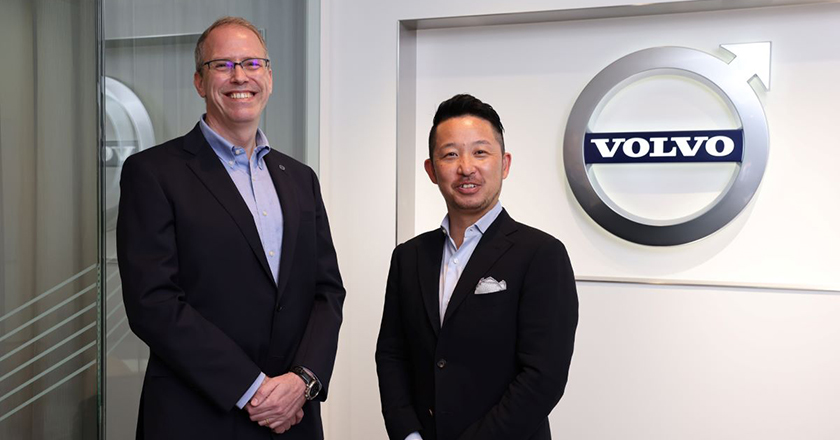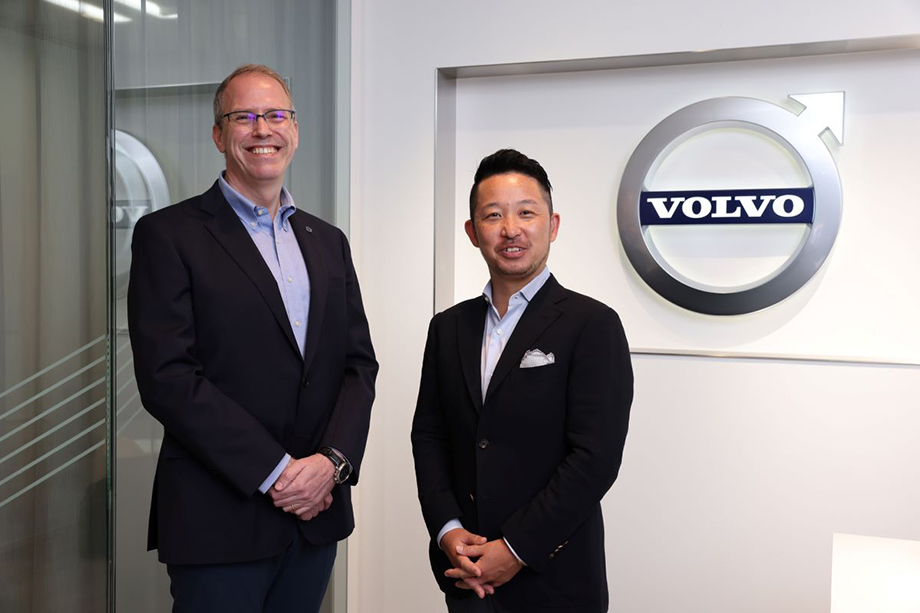
The automotive industry, which has been leading Japanese industry, is now undergoing a drastic change amid the surge of globalization. The Japanese automotive industry has led the world with its exceptional technology, but now it is facing a turning point that superior manufacturing technology alone is not enough to survive in the global market.
Therefore, it is supposed to be essential to foster “brands” in the Japanese automotive industry, as is emphasized in global marketing strategy. In this interview, Martin Persson, the CEO of Volvo Car Japan, who studied in Japan and thus has knowledge of both the global and Japanese market, and Susumu Harada, a professor specializing in the field of global branding who has long been researching the automotive industry, had a discussion on the theme of “branding”.
The conversation covered a wide range of topics such as the difficulty of branding for all industries, measures to overcome the high costs involved in manufacturing automobiles, sustainability and branding, major changes in the retail sales business, and the importance of having a global mindset.

Martin Persson
CEO of Volvo Car Japan. He was born in Sweden and has experience of studying at Meiji University School of Business Administration as an exchange student.
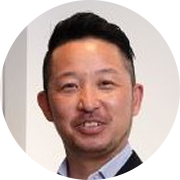
Susumu Harada
Professor at Meiji University, School of Business Administration. His main field of study is global brand management and brand value management. He also studies the automotive industry.

“Brand” can be a strength to withstand high production costs
Harada: I was looking forward to talking to you, as the CEO of Volvo Car Japan, which is the Japan-based subsidiary of the global automaker Volvo Car Group. Thank you for your time today.
First of all, it is said that the international automotive industry is facing innovative changes. What kind of changes do you think are occurring right now?
Persson: For automakers to keep growing, they must shift their business to more profitable fields like EVs (Electric Vehicles) or online sales, rather than ones that are likely to shrink in the future such as gasoline cars. I think we are at a tipping point for that.
Harada: When they make a shift to EVs, they need more investment in development and manufacturing, and that results in the higher costs.
Persson: That’s right. Automakers are under pressure to cut costs, but there’s a limit to what they can do, so they need a new strategy to tackle the problem of higher costs.
Harada: What do you think is the key to this strategy?
Persson: I believe one of the global strategies to overcome the problem of high costs is “powerful branding”.
Harada: I agree with you that “brand” is surely a key factor. It is an extremely important strategy not only in the automotive industry but also in global marketing. But Japanese companies seem a bit more hesitant in branding than their counterparts around the world, don’t they?
Persson: Yes, I feel the same way. Maybe Japanese manufacturers focus too much on “technologies”, like they proudly launch a new-model car, and announce “now, try it, and be surprised at our cutting-edge technology!”
Harada: You’re right. It seems to me, too, that they focus more on the functions of their products rather than the “brand”.
Persson: It is obvious that advanced technologies are important as automobiles are mechanical products. But together with that, it is significant to have a “strong brand”. If Japanese companies paid more attention to branding, the situation of global marketing would be more interesting.
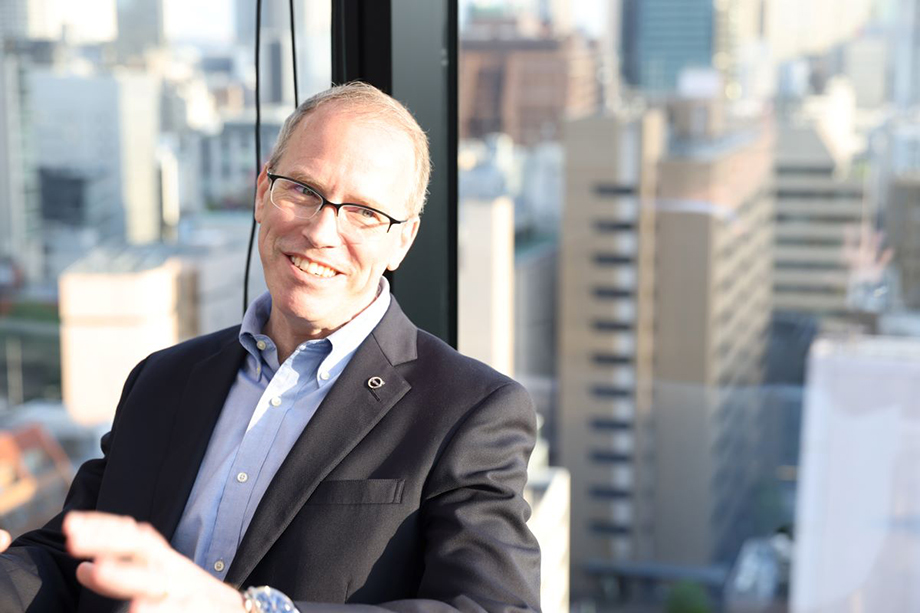
Volvo itself is a sustainable choice, and thus a strong “brand”
Harada: Volvo is a company that has successfully branded itself. What do you think is the key factor of branding?
Persson: I think it’s the “emotional” part.
Harada: I agree. The Volvo brand is “emotional”, and that is their strength which helps them lead the industry worldwide.
Could you please tell us the current “brand concept” of Volvo?
Persson: Volvo has a brand promise of “Freedom to Move”, and the three keywords here are “Safety”, “Sustainability” and “Personal”.
First, “Safety” is the core of our company policy, and is our advantage.
Harada: Right. Volvo has a strong corporate image of “Safety”. It’s the automotive maker that invented the three-point seatbelt about 60 years ago.
Persson: You know so much about it!
And the second keyword, “Sustainability”, is an indispensable concept for the future, and it is valued as the highest priority at Volvo now.
Harada: Most global companies express their support for sustainability aiming at the global goal of carbon neutrality by 2050. And, as one of such companies, why does Volvo regard “Sustainability” as something that would be the most powerful advantage?
Persson: Every company stands for sustainability now. But I wonder if any of them have truly understood the core concepts of the SDGs before advocating being “sustainable”?
Harada: Indeed. That’s difficult to see.
Persson: Volvo has traditionally been “sustainable”, and is a company that truly acts on its words. Actually, Volvo is the first brand that achieved electrification of all models of its vehicles.
Harada: So you mean the company fulfills its brand promises.
Persson: The floor carpet on EV model C40 is made from recycled plastic bottles. Also, we stopped distributing any paper catalogs several years ago. So, in this way, choosing Volvo is a “sustainable” action in itself.
Harada: That is really “sustainable”, and Volvo is truly a superior brand!
Persson: Exactly. And the third branding promise, “Personal”, means adapting to each customers and providing them with unique experiences.
Harada: That makes sense. In its branding, Volvo focuses on such aspects as the “emotional part” of experiences like “what kind of lifestyle one can enjoy with a Volvo”, or “the bond” between a customer and Volvo. Right?
Persson: Yes. We are focusing on soft values including the “emotional” aspect.
Harada: I think “Personalized experiences for each customers” is an important point of view in consideration of current consumer trends.
Persson: Volvo is a premium car manufacturer, so we value brand and customer satisfaction above all else.
Harada: In addition, I think that the stylish design, which is produced from excellent Swedish designing skills, is also a great advantage of Volvo.
Persson: Thank you very much. If all the companies start to turn their eyes more toward soft values of brands, like the “emotional side” or “bonds between customers and manufacturers”, I am sure that the value of “brands” will be enhanced in global marketing strategies.
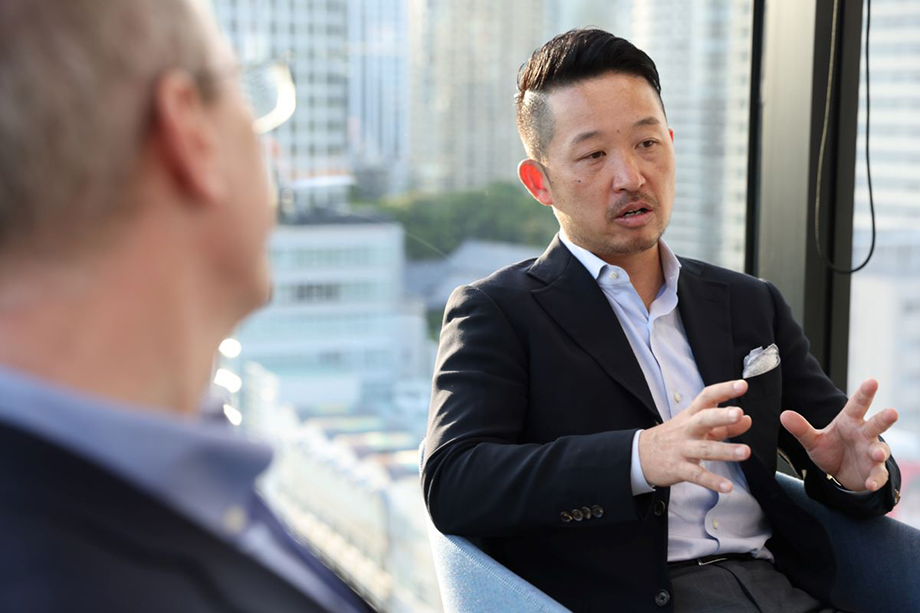
The brand presence of Japanese companies will be revived by global strategies
Harada: By the way, Volvo’s sales have increased although the total demand for automobiles in the world declined due to the COVID-19 pandemic. Now, in the course of this interview, I’ve come to think that the powerful branding of Volvo might have underpinned those sales. What’s your take on that?
Persson: Of course, the “brand” must have played a certain role.
Talking about sales, demand recovered by the 4th quarter of fiscal 2020. The challenge we are currently facing is procurement of semiconductors. However, Japanese customers have been able to get their cars so far, and this clearly shows that the headquarters of Volvo relies on and prioritizes the Japanese market.
Harada: I see. Semiconductor supply is an issue affecting higher manufacturing costs.
By the way, recently the entry into the automotive industry by companies from other industries is increasing around the world. I feel that this trend may revolutionize the industry. There has been a structure with the manufacturer at the top, and suppliers under it, consisting of second and third tier suppliers. Such structure of this industry may experience major changes from now. What do you think?
Persson: Customers will “choose a car” regardless of whether the manufacturer is a newcomer or not. To be chosen by a customer, the “brand power” will play a significant role.
Well, you also study marketing at automotive manufacturers, and I heard that you have conducted a research on Volvo Car Japan before.
What brought you to become interested in marketing for automakers?
Harada: In the 1980’s and 90’s, when we traveled abroad, we could see Japanese brand names everywhere. For example, in Europe, roads were filled with Toyota and Honda cars, and when talking about TV, people shouted things like “Panasonic is the best!” or “No, it’s Sony!”.
Persson: The presence of Japanese companies was overwhelming at that time.
Harada: But now, the market situation has changed drastically, and we hear brand names like Hyundai, Kia, Samsung, LG, etc. And I wondered why the market presence of Japanese companies has decreased. That served as a springboard for me to be interested in marketing for automotive manufacturers.
Persson: That reminds me of one question related to the presence of Japanese companies, which I’ve long been wondering. That is; “Why Japanese automakers have not taken a leadership position in the global trend of EVs, or the electrification of vehicles?”
The first plug-in hybrid car (PHEV) was actually developed in Japan.
Harada: Absolutely. Perhaps Japanese companies were focusing on the Japanese market rather than paying attention to the global trend.
Persson: You are right. Especially in the past, I could see their consciousness as “the Japanese market is special and unique”. When the Japanese market was big enough, probably it worked to tailor their marketing only to the “special and unique” Japanese market.
Harada: The market for automobiles in Japan has fallen to just under 5 million units, while the markets in China and the U.S. are expanding rapidly. I’m sure that now is the time to implement global strategies.
Persson: Well, a member of Volvo’s management team actually said a similar thing, like, “the Japanese market is special even now. I don’t think we can accomplish digitalization or online sales in Japan”.
But I don’t think that Japan is a special country. I believe it’s totally the same as others, but the strategies haven’t fully shifted to global ones yet.
Note: Plug-in Hybrid Car (PHEV) is an “ecocar”, or an ecologically friendly car, equipped with a battery charged via an external plug, and has a higher battery capacity than a hybrid car. PHEVs run on electric power alone.
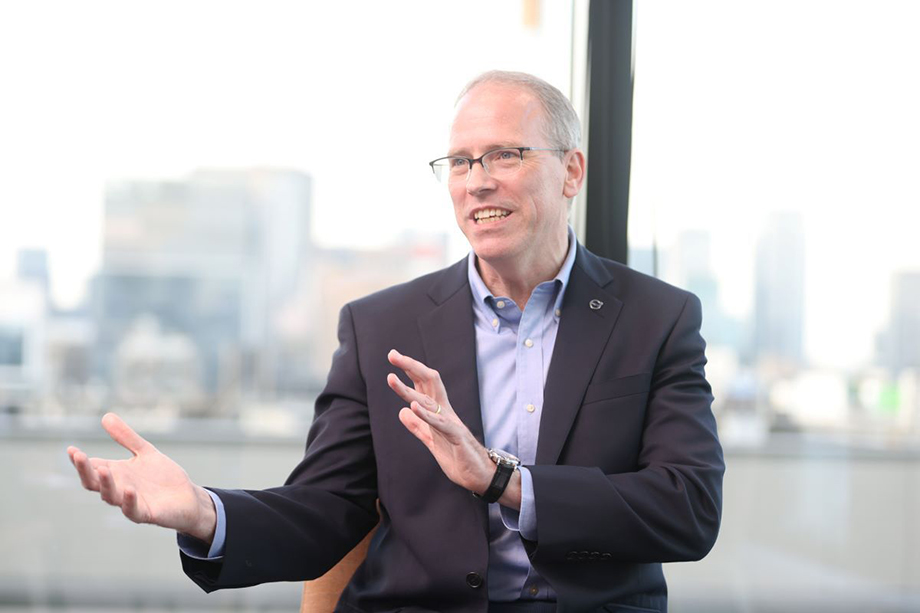
A “global mindset” is essential for everyone now
Persson: My mission when I came to Japan in 2020 was “to establish Volvo’s global strategies in Japan.” I believe I can achieve that goal as I have a solid understanding of Volvo’s global strategy together with a thorough knowledge about Japan. Now I’m tackling this challenge.
Harada: What do you think you need to accomplish the mission?
Persson: I think it’s a global mindset.
Harada: I see. In fact, global mindset is a major theme in international business research. But how do you think we can “change our mindset”?
Persson: It is important for us, the management team, to set a good example by ourselves and tell our staff “You can do it, so let’s keep trying”. And we should also keep sending the message as “It’s totally okay even if you don’t succeed”.
Harada: It is true that Japanese people try to avoid failure and minimize risk.
Persson: I always say to my staff, “It is so much better to try something and fail than to do nothing.” It’s all about “challenging yourself to do something new”.
Harada: Is it okay to try something and get an undesirable result?
Persson: Sure, yes! If there is a penalty, the organization can’t be really innovative. I think if we try to minimize the risk, the development of the business will slow down.
Harada: Indeed. We should be prepared to take some risks and develop business rapidly like tech companies do in agile software development, or we may fall behind in the global market.
Note: Agile development is a development process which enables speedy release of software, etc.
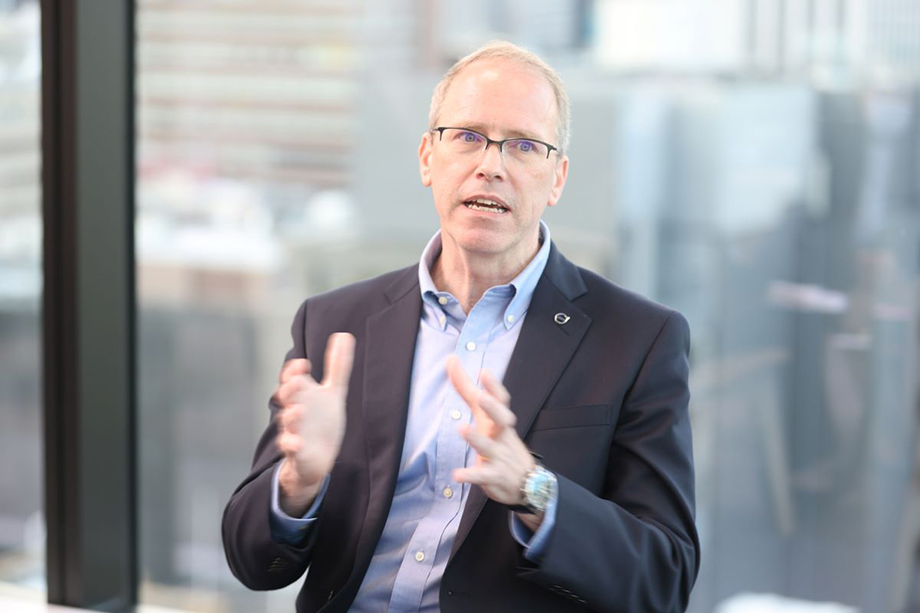
Short-cycle updates: that’s what’s happening in world industry
Persson: Yes, “delay” would be a major downside in the field of business.
Now, most of the automotive development processes have shifted to software development, that is, “agile development” as Professor Harada said.
At Volvo, software packages are updated roughly every 3 months, and such updates are provided wirelessly, which is called “Over-The-Air”, or OTA.
Harada: Every 3 months?
Persson: Yes. Speed is our priority in this day and age.
Harada: That is possible because everything is connected to the Internet, isn’t it?
Persson: Strictly speaking, regulations regarding the Internet differ from country to country, so in some countries we cannot implement everything OTA. In Japan, it is not allowed so far, but we are proceeding with development while taking this into consideration.
Harada: Such development procedures will be put into practice in all countries in the near future, right?
Persson: Yes. Cars will be able to get new software from the Internet, just like we do with our iPhone.
Harada: Is that possible with all kinds of Volvo cars?
Persson: Yes, it’s applicable to any cars. Actually, Volvo supports cars other than EVs as well. If all the steps are able to be done OTA, the business model will change significantly. For example, you can subscribe to a car and make payment OTA――that’s what this kind of business is like.
Harada: So kind of “aggressive” agile software development is even more emphasized now.
Note: OTA, or Over-The-Air, is a method of updating the software on in-vehicle computers, using data transmission via wireless communications.
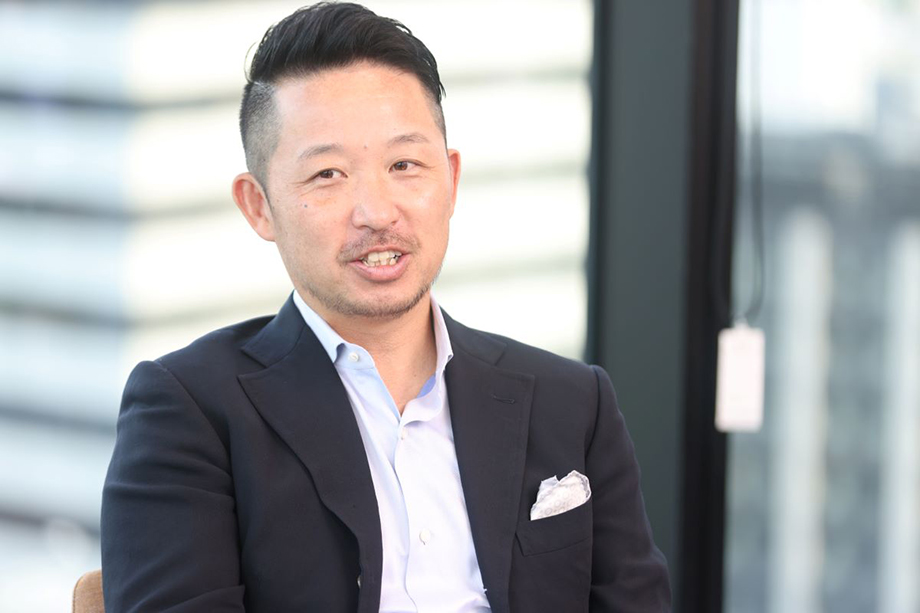
Going online spurs focus on “brands”
Harada: As Mr. Persson mentioned earlier, Volvo Car Japan has started online sales of EVs as part of its global strategy.
Persson: Yes. We started online sales and subscription service of EVs last year. It was really a difficult trial, but I felt it was also rewarding, and I am quite confident about the result.
Harada: You are steadily establishing Volvo’s global strategies in Japan. In the course of it, have you seen any significant changes in the retail sales field?
Persson: One major trend is that online sales will surely continue to increase. Then, we won’t need a lot of conventional sales persons any more who directly talk to customers at the site. Instead, we need more human resources to support on-line sales.
Harada: You mean, “O to O” or “Online to Offline” personnel who build bridges between online and offline aiming at smooth communication?
Persson: That’s right. We set up a call center when we started online sales. Now the staff at our call center handle the interaction with customers, which was done by on-site sales persons before.
Harada: Now when we buy a new car, we don’t need to visit the dealer many times any more.
Persson: Formerly, our customers visited our dealership 3 or 4 times before they finally decide to purchase it. But now, it’s down to only once or so. When customers have any questions or need further information, the call center is available all-year-around across a wide range of time of day. So customers can choose a car at any time at their convenience, lying on the couch.
But still, the delivery or after-sale customer services will be provided off-line, so I think the need for O to O communications will increase.
Harada: Taking into consideration that customers won’t any more go to a dealer or talk with a sales person, the value of “brand” becomes even more important. We would ask ourselves “which brand should I choose?” when we buy a car.
Persson: Definitely. Now that anyone can get information on functions or specifications from the Internet, we don’t need to explain that part face to face any more.
Harada: Is “brand” getting more important in the retail sales field, too?
Persson: I think what the customers truly want to know about is “brand”, that is, “how the Volvo brand is different from their competitors”. So we need to have a strong brand in the world market.
Aiming to be the leader in sustainability and EVs
Harada: Lastly, what is your future vision of Volvo Car Japan?
Persson: We would like to be a leader in sustainability and the electrification of vehicles field. I believe that the trend of automobile electrification will be accelerated soon. With this situation, Volvo Car Japan is aiming to show its presence and lead the market.
Harada: I see. That vision also derives from your perspective of global strategies, doesn’t it?
Persson: Being the leader of EV could be a powerful “brand” itself.
Harada: Exactly. “Brand” is the most important.
Thank you very much for your time and a fascinating discussion today.
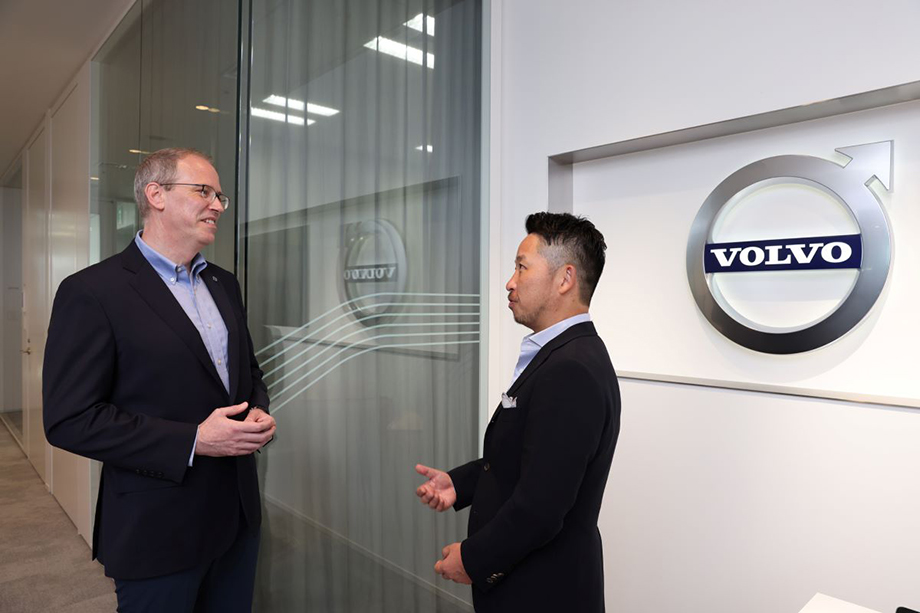
After the interview
Persson: I found a lot of interesting perspectives as Professor Harada is a researcher who has an academic standpoint and a deep insight into automotive industry.
Harada: I am grateful that I could learn directly from the president of Volvo Car Japan about current policies and efforts at Volvo, a leading brand in the industry. I am sure this will be an advantage in my research.
Martin Persson
CEO of Volvo Car Japan. Born in Sweden, he studied at Meiji University School of Business Administration as an exchange student. In 1999, he joined Volvo Japan, the predecessor of Volvo Car Japan, as a local hire. In 2008, he was hired by the head office and transferred to Sweden, where he worked as the Head of Global CRM (Customer Relationship Management). After working in Russia and China as the Head of Customer Services, he was appointed President of Volvo Car Russia in 2019. Mr. Persson came to Japan again and became President of Volvo Car Japan in 2020, and is currently working on implementing Volvo’s global strategies in Japan.
Susumu Harada
Professor at Meiji University School of Business Administration. Ph.D. in Business Administration from the Graduate School of Business Administration, Meiji University. In 2012, he was a visiting fellow at The Centre for Evolution of Global Business and Institutions, The University of York (UK). He became a professor at University of Hyogo School of Business Administration, in 2015. In 2017, he joined the faculty at Meiji University School of Business Administration and became a professor in 2018. He specializes in fields such as global brand management and brand value management. He is a member of the Japanese Society for Distributive Sciences (vice president and director), the Japan Academy of Multinational Enterprises (director), and Japan Academy of International Business Studies (secretary). He is the author of “Global Brand Management (Burando Kanri Ron)” published by Hakuto Shobo.
* The information contained herein is current as of June 2022.
* The contents of articles on Meiji.net are based on the personal ideas and opinions of the author and do not indicate the official opinion of Meiji University.
Information noted in the articles and videos, such as positions and affiliations, are current at the time of production.

